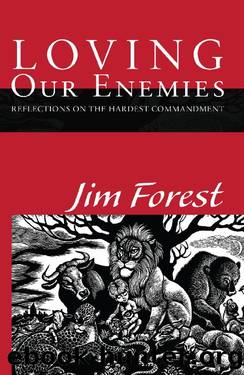Loving Our Enemies: Reflections on the Hardest Commandment by Jim Forest

Author:Jim Forest [Forest, Jim]
Language: eng
Format: epub
Publisher: Orbis Books
Published: 2014-10-09T22:00:00+00:00
Doing Good to Our Enemies
PRAYER IS ESSENTIAL, but prayer is not enough. Jesus calls us not only to pray but to act. In the words of Christ, “Do good to those who hate you, bless those who curse you” (Luke 6:28). Far from being an alternative to action, prayer helps empower us to undertake acts we might otherwise have been incapable of doing. It is useless to expect God to do what we refuse to help achieve. If we want God to take a prayer seriously, we need to take it seriously ourselves.
Contrary to popular belief, Jesus’ teaching about active love toward enemies was not new doctrine. We find in the Mosaic Law: “If you meet your enemy’s ox or his donkey going astray, you shall bring it back to him. If you see the donkey of one who hates you lying under a burden, you shall refrain from leaving him with it” (Exodus 23:4-5).
In the same vein, the Mosaic Law forbids the destruction of the fruit trees of enemies or the poisoning of their wells. The book of Proverbs actually calls for positive acts of caring for the well-being of adversaries: “If your enemy is hungry, give him bread” (25:21). This was taken up and expanded by Saint Paul:
Bless those who persecute you; bless and do not curse them. Rejoice with those who rejoice, weep with those who weep. Live in harmony with one another; do not be haughty, but associate with the lowly; never be conceited. Repay no one evil for evil, but take thought for what is noble in the sight of all. If possible, so far as it depends upon you, live peaceably with all. Beloved, never avenge yourselves, but leave it to the wrath of God; for it is written, “vengeance is mine, I will repay, says the Lord.” No, if your enemy is hungry, feed him; if he is thirsty, give him drink; for by doing so you will heap burning coals upon his head. Do not be overcome by evil, but overcome evil with good. (Romans 12:14-21)
You’ve read it once, now read it again more slowly. Paul is simply amplifying the basic teachings of Jesus. He does so without encouraging unrealistic expectations that peace can be obtained simply by one’s own peaceable behavior, though it might. The suffering that the young church had experienced, despite the most exemplary behavior, was clear evidence that there was sometimes no defense at all against the evil done by others. Paul must have often recalled the stoning of Stephen, a merciful and innocent man whose death he had witnessed and which occurred with his consent; he may even have been among those throwing the stones (Acts 7:58-60).
Paul calls on Christians to live peaceably with others no matter how unpeaceful those others may be, and in no case to seek revenge. If vengeance is required, he says, that is God’s business. But for followers of Jesus, far from striking back at those who strike us, we are to
Download
This site does not store any files on its server. We only index and link to content provided by other sites. Please contact the content providers to delete copyright contents if any and email us, we'll remove relevant links or contents immediately.
The 5 Love Languages: The Secret to Love That Lasts by Gary Chapman(8478)
The Space Between by Michelle L. Teichman(6077)
Assassin’s Fate by Robin Hobb(5226)
Wiseguy by Nicholas Pileggi(4576)
Everything Happens for a Reason by Kate Bowler(4061)
Gerald's Game by Stephen King(3912)
A Simplified Life by Emily Ley(3564)
The Power of Positive Thinking by Norman Vincent Peale(3442)
Pillow Thoughts by Courtney Peppernell(3379)
Resisting Happiness by Matthew Kelly(2881)
Girl, Wash Your Face by Rachel Hollis(2818)
Being Aware of Being Aware by Rupert Spira(2701)
Name Book, The: Over 10,000 Names--Their Meanings, Origins, and Spiritual Significance by Astoria Dorothy(2487)
Real Sex by Lauren F. Winner(2466)
More Language of Letting Go: 366 New Daily Meditations by Melody Beattie(2434)
The Holy Spirit by Billy Graham(2406)
Fast Facts on Defending Your Faith by John Ankerberg & John Weldon(2386)
Victory over the Darkness by Neil T. Anderson(2382)
The Secret Power of Speaking God's Word by Joyce Meyer(2245)
